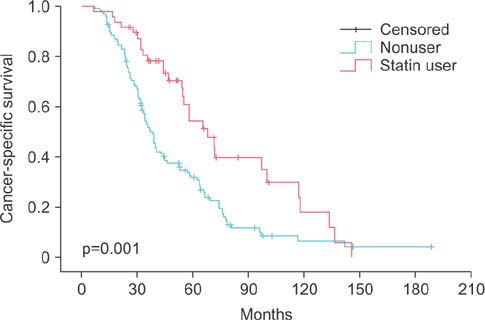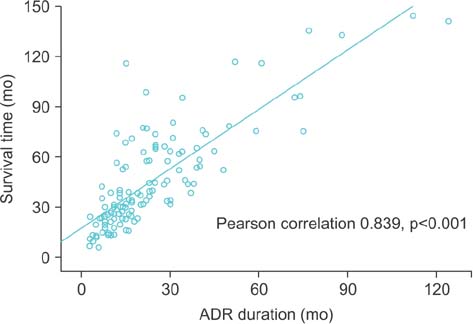Korean J Urol.
2015 Sep;56(9):630-636. 10.4111/kju.2015.56.9.630.
Effects of statin use on the response duration to androgen deprivation therapy in metastatic prostate cancer
- Affiliations
-
- 1Department of Urology, Asan Medical Center, University of Ulsan College of Medicine, Seoul, Korea. cskim@amc.seoul.kr
- KMID: 2344101
- DOI: http://doi.org/10.4111/kju.2015.56.9.630
Abstract
- PURPOSE
To determine whether statin use delays the development of castration-resistant prostate cancer (CRPC) in patients with metastatic prostate cancer treated with androgen deprivation therapy (ADT).
MATERIALS AND METHODS
A total of 171 patients with metastatic prostate cancer at the time of diagnosis who were treated with ADT between January 1997 and December 2013 were retrospectively analyzed. The patients were classified into two groups: the nonstatin use group (A group) and the statin use group (B group). Multivariate analysis was performed on statin use and other factors considered likely to have an effect on the time to progression to CRPC.
RESULTS
The mean patient age was 67.1+/-9.1 years, and the mean follow-up period was 52 months. The mean initial prostate-specific antigen (PSA) level was 537 ng/mL. Of the 171 patients, 125 (73%) were in group A and 46 (27%) were in group B. The time to progression to CRPC was 22.7 months in group A and 30.5 months in group B, and this difference was significant (p=0.032). Blood cholesterol and initial PSA levels did not differ significantly according to the time to progression to CRPC (p=0.288, p=0.198). Multivariate analysis using the Cox regression method showed that not having diabetes (p=0.037) and using a statin (p=0.045) significantly increased the odds ratio of a longer progression to CRPC.
CONCLUSIONS
Statin use in metastatic prostate cancer patients appears to delay the progression to CRPC. Large-scale, long-term follow-up studies are needed to validate this finding.
Keyword
MeSH Terms
-
Adenocarcinoma/drug therapy/*secondary
Adult
Aged
Aged, 80 and over
Androgen Antagonists/therapeutic use
Antineoplastic Combined Chemotherapy Protocols/therapeutic use
Body Mass Index
Diabetes Mellitus/drug therapy
Disease Progression
Humans
Hydroxymethylglutaryl-CoA Reductase Inhibitors/*therapeutic use
Male
Middle Aged
Neoplasm Grading
Prostatic Neoplasms, Castration-Resistant/drug therapy/*pathology/*prevention & control
Protective Factors
Retrospective Studies
Survival Rate
Time Factors
Androgen Antagonists
Hydroxymethylglutaryl-CoA Reductase Inhibitors
Figure
Reference
-
1. Stewart BW, Wild CP. World cancer report 2014. Geneva: World Health Organization;2014.2. Hamilton RJ, Goldberg KC, Platz EA, Freedland SJ. The influence of statin medications on prostate-specific antigen levels. J Natl Cancer Inst. 2008; 100:1511–1518.3. Yang L, Egger M, Plattner R, Klocker H, Eder IE. Lovastatin causes diminished PSA secretion by inhibiting AR expression and function in LNCaP prostate cancer cells. Urology. 2011; 77:1508.e1–1508.e7.4. Yokomizo A, Shiota M, Kashiwagi E, Kuroiwa K, Tatsugami K, Inokuchi J, et al. Statins reduce the androgen sensitivity and cell proliferation by decreasing the androgen receptor protein in prostate cancer cells. Prostate. 2011; 71:298–304.5. Murtola TJ, Tammela TL, Lahtela J, Auvinen A. Cholesterol-lowering drugs and prostate cancer risk: a population-based case-control study. Cancer Epidemiol Biomarkers Prev. 2007; 16:2226–2232.6. Graaf MR, Beiderbeck AB, Egberts AC, Richel DJ, Guchelaar HJ. The risk of cancer in users of statins. J Clin Oncol. 2004; 22:2388–2394.7. Platz EA, Leitzmann MF, Visvanathan K, Rimm EB, Stampfer MJ, Willett WC, et al. Statin drugs and risk of advanced prostate cancer. J Natl Cancer Inst. 2006; 98:1819–1825.8. Poynter JN, Gruber SB, Higgins PD, Almog R, Bonner JD, Rennert HS, et al. Statins and the risk of colorectal cancer. N Engl J Med. 2005; 352:2184–2192.9. Nielsen SF, Nordestgaard BG, Bojesen SE. Statin use and reduced cancer-related mortality. N Engl J Med. 2012; 367:1792–1802.10. Blais L, Desgagne A, LeLorier J. 3-Hydroxy-3-methylglutaryl coenzyme A reductase inhibitors and the risk of cancer: a nested case-control study. Arch Intern Med. 2000; 160:2363–2368.11. Hamilton RJ, Banez LL, Aronson WJ, Terris MK, Platz EA, Kane CJ, et al. Statin medication use and the risk of biochemical recurrence after radical prostatectomy: results from the Shared Equal Access Regional Cancer Hospital (SEARCH) Database. Cancer. 2010; 116:3389–3398.12. Oh DS, Koontz B, Freedland SJ, Gerber L, Patel P, Lewis S, et al. Statin use is associated with decreased prostate cancer recurrence in men treated with brachytherapy. World J Urol. 2015; 33:93–97.13. Breau RH, Karnes RJ, Jacobson DJ, McGree ME, Jacobsen SJ, Nehra A, et al. The association between statin use and the diagnosis of prostate cancer in a population based cohort. J Urol. 2010; 184:494–499.14. Loeb S, Kan D, Helfand BT, Nadler RB, Catalona WJ. Is statin use associated with prostate cancer aggressiveness? BJU Int. 2010; 105:1222–1225.15. Farwell WR, D'Avolio LW, Scranton RE, Lawler EV, Gaziano JM. Statins and prostate cancer diagnosis and grade in a veterans population. J Natl Cancer Inst. 2011; 103:885–892.16. Pelton K, Freeman MR, Solomon KR. Cholesterol and prostate cancer. Curr Opin Pharmacol. 2012; 12:751–759.17. Zhuang L, Kim J, Adam RM, Solomon KR, Freeman MR. Cholesterol targeting alters lipid raft composition and cell survival in prostate cancer cells and xenografts. J Clin Invest. 2005; 115:959–968.18. Zhuang L, Lin J, Lu ML, Solomon KR, Freeman MR. Cholesterol-rich lipid rafts mediate akt-regulated survival in prostate cancer cells. Cancer Res. 2002; 62:2227–2231.19. Freeman MR, Solomon KR. Cholesterol and prostate cancer. J Cell Biochem. 2004; 91:54–69.20. Twiddy AL, Cox ME, Wasan KM. Knockdown of scavenger receptor class B type I reduces prostate specific antigen secretion and viability of prostate cancer cells. Prostate. 2012; 72:955–965.21. Graaf MR, Richel DJ, van Noorden CJ, Guchelaar HJ. Effects of statins and farnesyltransferase inhibitors on the development and progression of cancer. Cancer Treat Rev. 2004; 30:609–641.22. Mo H, Elson CE. Studies of the isoprenoid-mediated inhibition of mevalonate synthesis applied to cancer chemotherapy and chemoprevention. Exp Biol Med (Maywood). 2004; 229:567–585.23. Anwar MA, Kheir WA, Eid S, Fares J, Liu X, Eid AH, et al. Colorectal and prostate cancer risk in diabetes: metformin, an actor behind the scene. J Cancer. 2014; 5:736–744.24. Deng L, Gui Z, Zhao L, Wang J, Shen L. Diabetes mellitus and the incidence of colorectal cancer: an updated systematic review and meta-analysis. Dig Dis Sci. 2012; 57:1576–1585.25. Kasper JS, Liu Y, Giovannucci E. Diabetes mellitus and risk of prostate cancer in the health professionals follow-up study. Int J Cancer. 2009; 124:1398–1403.26. Harding JL, Shaw JE, Peeters A, Cartensen B, Magliano DJ. Cancer risk among people with type 1 and type 2 diabetes: disentangling true associations, detection bias, and reverse causation. Diabetes Care. 2015; 38:264–270.27. Waters KM, Henderson BE, Stram DO, Wan P, Kolonel LN, Haiman CA. Association of diabetes with prostate cancer risk in the multiethnic cohort. Am J Epidemiol. 2009; 169:937–945.28. Hwang IC, Park SM, Shin D, Ahn HY, Rieken M, Shariat SF. Metformin association with lower prostate cancer recurrence in type 2 diabetes: a systematic review and meta-analysis. Asian Pac J Cancer Prev. 2015; 16:595–600.
- Full Text Links
- Actions
-
Cited
- CITED
-
- Close
- Share
- Similar articles
-
- Chemotherapy With Androgen Deprivation for Hormone-Naïve Prostate Cancer
- Current Concepts in Androgen Deprivation Therapy
- Long-Lasting Antiandrogen Withdrawal Syndrome in Castration-Resistant Prostate Cancer: Three Cases With Complete Response
- How Does Androgen Deprivation Therapy Affect Mental Health including Cognitive Dysfunction in Patients with Prostate Cancer?
- The Effect of Endocrine Therapy on Angiogenesis and the Expression of Thrombospondin-1 and Vascular Endothelial Growth Factor in Prostate Cancer




